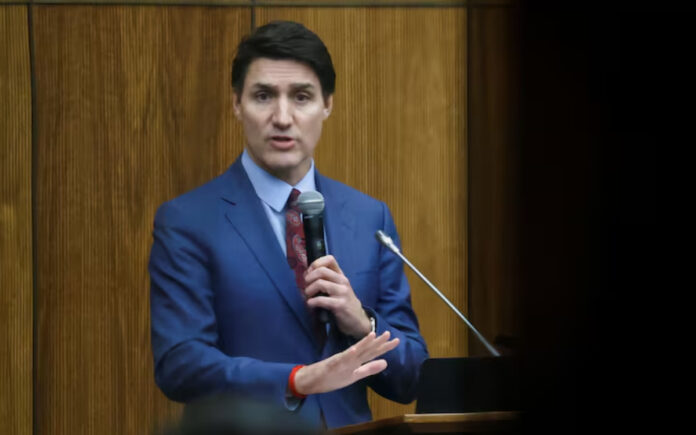Ottawa: Canadian Prime Minister Justin Trudeau appears poised to lose power early next year after a critical ally announced plans to bring down the minority Liberal government and force an election.
New Democratic Party (NDP) leader Jagmeet Singh, who has supported Trudeau’s government, declared on Friday that he would table a formal motion of no-confidence when the House of Commons reconvenes on January 27 after its winter break.
“No matter who is leading the Liberal Party, this government’s time is up. We will put forward a clear motion of non-confidence in the next sitting of the House of Commons,” Singh stated.
After a string of poll losses and growing unpopularity, Canadian PM Justin Trudeau faces a no-confidence motion from a key ally, potentially ending his tenure as Canada braces for the incoming Trump administration in the US https://t.co/twjRToALnQ pic.twitter.com/3rrPcvRukZ
— Reuters (@Reuters) December 21, 2024
If all opposition parties unite behind the motion, Trudeau’s tenure as prime minister will come to an end after more than nine years, triggering a federal election.
Recent polls over the past 18 months indicate widespread voter discontent with the Liberals due to economic challenges, including rising prices and a worsening housing crisis. The data suggests the Liberals could face a significant defeat at the hands of the right-leaning Conservative Party, the official opposition.
The NDP, traditionally competing with the Liberals for center-left voters, has criticized Trudeau for being excessively aligned with corporate interests. Bloc Quebecois leader Yves-François Blanchet has also pledged to back the no-confidence motion, asserting there is no viable path for Trudeau to retain power.
The Conservatives have proposed asking Governor General Mary Simon, who represents King Charles III as Canada’s head of state, to recall Parliament for an earlier no-confidence vote before the year ends. However, constitutional experts widely agree Simon would reject such a request.
“We cannot have a chaotic clown show running our government into the ground. What is clear is that Justin Trudeau does not have the confidence of Parliament,” Conservative leader Pierre Poilievre told reporters.
Amid increasing pressure, including the abrupt resignation of Finance Minister Chrystia Freeland earlier this week, Trudeau presided over a cabinet shuffle on Friday. Smiling but silent, Trudeau declined to comment publicly and departed without addressing reporters. His office also canceled traditional end-of-year interviews, fueling further speculation about his leadership.
Votes on budgets and other financial measures are considered confidence votes, as are certain designated opposition days during parliamentary sessions. Singh’s decision to act decisively introduces a political gamble, as polls indicate unfavorable outcomes not just for the Liberals but also for the NDP.
Also Read | Houthi Missile Reaches Tel Aviv-Jaffa: 14 Lightly Injured, Israeli Military Confirms
Darrell Bricker, CEO of polling firm Ipsos-Reid, remarked, “Waiting to give the Liberals and even Trudeau a chance to get off the mat is ill-advised.” He suggested Singh’s strategy could position the NDP as the primary alternative to the Conservatives.
A source close to Trudeau disclosed that the prime minister intends to use the Christmas break to contemplate his future but is unlikely to make any announcements before January. Should Trudeau resign, the Liberal Party would face logistical challenges, as electing a new leader through a convention could take months. This would force the party to contest an election with an interim leader, an unprecedented situation in Canadian political history.
Also Read | Netflix to Broadcast 2027 and 2031 Women’s World Cups in U.S.
Despite the mounting turmoil, Trudeau’s cabinet remains publicly supportive, though at least 20 Liberal lawmakers have openly called for his resignation.
Adding to the urgency of the political crisis is the anticipated impact of a 25% tariff on Canadian imports, promised by U.S. President-elect Donald Trump, who takes office on January 20. The measure is expected to significantly harm Canada’s economy. Provincial premiers, striving to present a unified stance against the tariffs, have expressed frustration over the perceived disarray in Ottawa.



